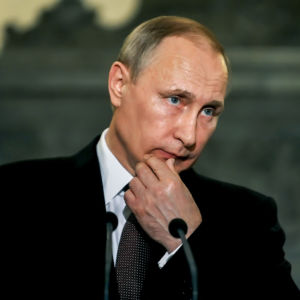Russia’s menacing actions near Ukraine have the U.S. and other western nations fearful of a pending invasion.
A buildup of more than 90,000 Russian military troops is assembled across the border from Ukraine prompting Ukrainian to suggest an invasion, perhaps precipitated by a coup.
Speaking at a NATO ministers meeting in Latvia, U.S. Secretary of State Antony Blinken said it is not clear if Russian President Vladimir Putin has decided whether to invade.
Just as China has become emboldened toward Taiwan, likely because of the ill-fated U.S. abandonment of Afghanistan, it may be that Russia also sees the U.S. evacuation as opening the door for an attack that will not be countered.
Putin is clearly worried that Ukraine will gain membership in NATO and thus gain the benefits of protection from member nations.
For its part, Russia contends it is not preparing for an assault.
Russia, “has accused Ukraine and NATO of whipping up tensions and suggested Kyiv might be preparing to try to seize back two eastern regions controlled by pro-Russian separatists since 2014.”
Putin’s government is putting out this message while nearly simultaneously stating that Russia will not “accept the supply of NATO weapons to Ukraine or any NATO military presence…”
As reported by the AP, Putin “will seek binding guarantees precluding NATO’s expansion to Ukraine during a planned call” with Biden.
This is not to suggest that U.S. or NATO military intervention is either inevitable or anticipated but press conference bluffs will not suffice to deter Russia.
Action now is needed before Russia acts.
Economic sanctions can be implemented in case of Russian movement and could come in multiple forms.
One such action, as the Atlantic Council suggests, includes “termination of the Nord Stream 2 gas pipeline that connects Russia and Germany,” which could devastate an already weak Russian economy. Numerous other sanctions, not only from the U.S. but other major European trading partners are also likely being considered.
Economic sanctions are not enough.
Helping to build the strength of Ukraine’s military could likewise impede any headlong Russian invasion. While it is obvious the defense forces of Ukraine are no long-term match for the Russian military, the prospect of a protracted engagement likely does not sell well in Russia.
There is no appetite in Russian cities for seeing dead Russian soldiers on television.
Military support can include weaponry such as air defense systems, intelligence cooperation, international training for varying troop formations from platoon to brigade, and significant training exercises that include international elements.
That support should include ongoing training missions from all the NATO countries and others to show wide support.
Diplomatic cohesion is also important.
Along with international military training and cooperation, diplomatic activity is essential. Actions could include recalling diplomats, expelling Russian diplomats from overseas missions, and excluding Russia from major economic and political conferences.
Information systems must be harassed and penetrated.
Attacking Russian cyber and information operations systems, both military and civilian, are necessary to impede movement, coordination, and command and control elements and disrupt economic activity.
Actions against military information systems, can disrupt, delay, and confuse a centralized Russian military structure. While all of that takes place behind the scenes, the Russians would feel it quickly and already understand that such efforts can be ramped up at will.
It is an open question whether Biden and the NATO member nations will stand firm. NATO Secretary-General Jens Stoltenberg says that Russia “does not have a veto.”
White House press secretary Jen Psaki, speaking on behalf of President Joe Biden, told reporters recently, “NATO member countries decide who is a member of NATO, not Russia.”
The western nations know that in fact it falls squarely on President Biden to demonstrate to Putin’s intimidation will not be accepted.
Questions remain. Does NATO intend to stand firm on taking action to head off a Russian invasion? Will NATO enforce significant economic sanctions should they be imposed? Will NATO provide equipment and training to Ukraine that the Russians will understand as something that will make invasion very painful? Will NATO, and particularly the U.S., employ powerful cyber and information systems attacks to adversely affect Russian operations?
And finally, will the Biden administration and NATO members decide Ukrainian membership in NATO based on its needs or pressure from Russia?

